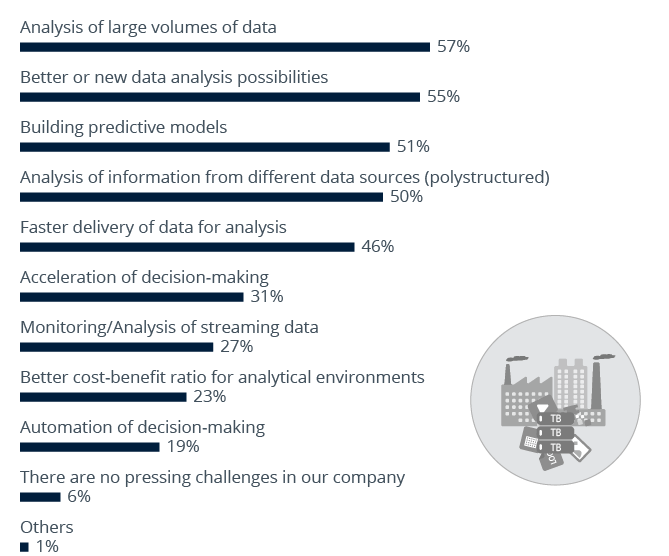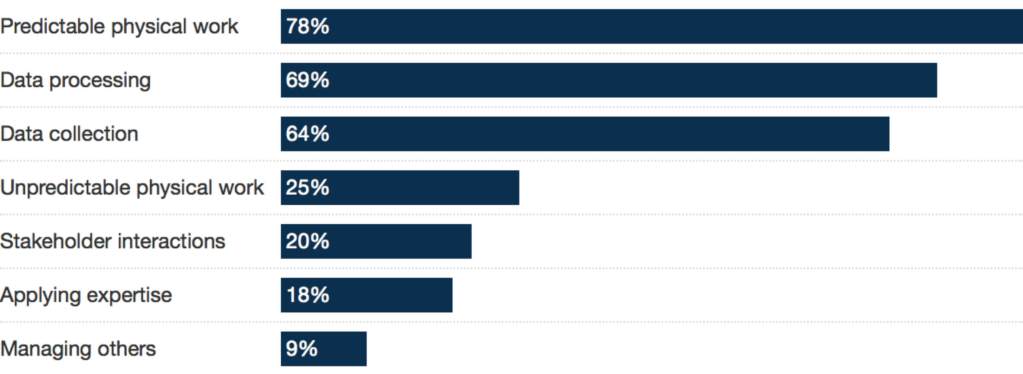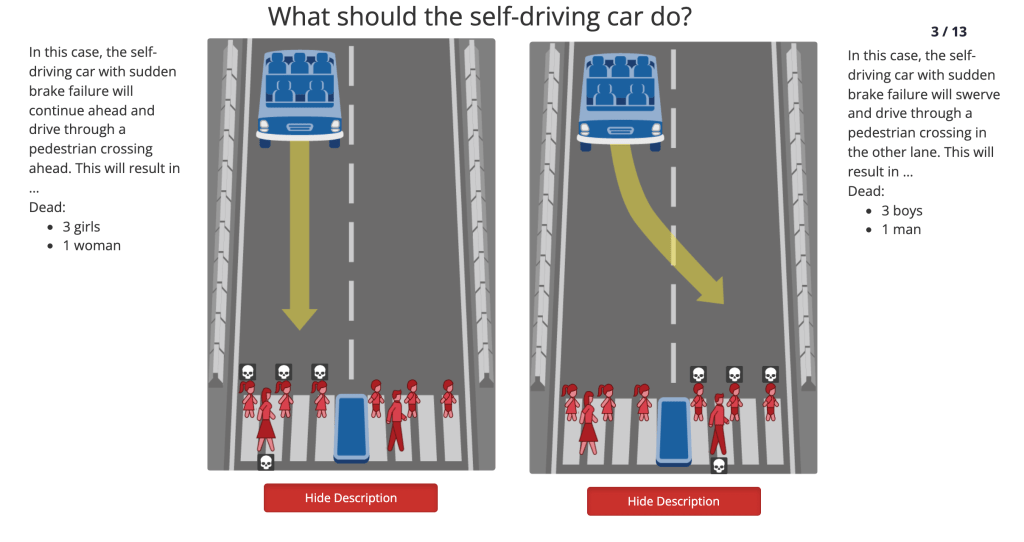11 Artificial Intelligence Issues You Should Worry About
Artificial intelligence (AI) is arguably one of the hottest topics of the 20s. And it’s unlikely to change any time soon.
The developments in machine learning (ML), expert systems, and other AI technologies will have an immense influence on how we live, rest, and interact with others. Heck, they already impact so many areas, often without us even realizing it.
Robots control entire production chains. Sophisticated algorithms protect us and create hyper-personalized experiences. There’s a lot to be grateful for, but there are darks sides behind the perks we ought to talk about.
AI has the power to kick us out of our daily jobs. AI listens and watches us constantly. AI will crave power, and it will be granted some – with noble intentions but perhaps also with detrimental effects.
Hollywood sci-fi blockbusters are not usually the greatest prophets. Could they be onto something this time, though?
Artificial intelligence is everywhere
Look around. No artificial intelligence? Look closely, and you’ll find it!
Since artificial intelligence aims to help humans perform compound and routine tasks better, it has found applications in dozens of fields.
To name a few, AI is widely used in:
- business processes optimization
- data analytics
- digital marketing
- supply chain and logistics
- cyber security
- our daily lives
In terms of businesses, improving customer experience is the top use case of AI and ML in 2021:

When it comes to AI in our daily lives, we interact with voice-to-text, personal assistants, autocorrect, smart recommendations on social media or streaming services, and more. Even now, as I’m writing this sentence, Smart Compose is assisting me…
The separate segment is robots… They are storming our planet ?! In just manufacturing industries, 2.7 million robot units operated worldwide in 2020 according to an IFR report. Robotics, as a part of AI, is used in agriculture, military, healthcare, the automotive industry, and many other fields.
Even kitchen robots – steel chefs – is a trend that changes how we get food and eat.
These are only the apparent use cases of artificial intelligence and related technologies we may interact with. See the illustration below for more examples:

Why AI is hyping: 4 benefits of artificial intelligence
It’s clear that AI is spread among dozens of industries, businesses, and human activities. But why?
Artificial intelligence solutions are popular because of 4 main reasons:
AI isn’t afraid of routine
In many industries, AI saves people from the avalanche of absorbing routine.
- AI assets are constantly available, e.g., AI bots can work 24/7. And they won’t complain or ask for a raise.
- If a task has a clear pattern and should be done periodically, AI can understand the rules and do the job.
- AI is very good at automated processes. Why should employees do a task manually if AI can automate it?
As a result, organizations take away monotonous work from humans using RPA (robotic process automation) and other AI-driven solutions. Artificial intelligence is capable of performing rule-based, cycled work, processing high volumes of data, and operating in multiple systems.
And these features are surprisingly good at doing various tasks – from uploading data files and booking events to complex cloud systems monitoring.
AI optimizes processes like a boss
From AI’s courage of taking routine, companies receive optimization in resources, time, and quality.
Artificial intelligence in manufacturing does arguably the most crucial thing – reduce production costs by maintaining the same quality of goods and improving the speed of delivery. This is possible through precise manufacturing scheduling and demand forecasting. Simultaneously, human error, according to Vanson Bourne, results in 23% of failures and delays. It can be improved with AI-driven means.
In modern ecommerce, you’re able to analyze customer data in a faster manner and deliver a qualitative, personalized customer experience with AI. Artificial intelligence in retail is the way to optimize prices and overcome competitors.
Even in a government segment, workers spend on average 20% of their time on peripheral and tedious tasks that AI can easily optimize to save time.
No need to dive into each field because the core point here is that AI can handle tasks faster than humans and with fewer errors. Eventually, this establishes the optimized execution, which leads to saving resources.
AI leverages data analytics
Artificial intelligence goes hand in hand with data. We have an established concept of data science that relates to Big Data, advanced analytics, and data mining.
Machine learning algorithms are capable of not only fastening the data analysis but making it more precise. As a result, businesses get insights from processed terabytes of data, which allows tracking trends and predicting patterns in marketing, customer experience, and more.
In the current business environment, organizations operate with massive data assets. That’s why they use Big Data to initiate advanced analytics and promote business intelligence (BI) that refines decision-making and overall business performance.
The chart below shows that most data analysis processes are improved with Big Data and AI solutions.

Besides, advanced analytics works well with more traditional data analysis. It allows you to operate within multiple systems and execute compound analytical queries.
AI protects us
Machine learning and data science shape a new approach to civil, cyber, and national security.
In terms of civil security, the concept of a smart, safe city emerges. It consists of surveillance, facial-recognition systems, predictive policing, and new service systems able to process vast amounts of data in real-time.
AI has already contributed to crime detection and prevention. As a result, Chris Teale reports that AI-driven technologies help decrease crime rates by 30% and improve emergency response by 20%.
Artificial intelligence in cyber security presents an advanced level of protection. Due to the growing number of cyberattacks and other digital criminal actions, we need more robust security, which AI delivers – from antivirus software and VPN solutions to more sophisticated protection.
Among other applications, AI technologies help with:
- ensuring consistent data privacy
- preventing cyberattacks of various scales
- detecting new cyber threats
- fighting bad internet bots and crawlers
- intercepting data breaches
- improving personal devices’ protection
- identifying phishing, identity theft, and other fraud
- creating secure communication channels
Both these areas – civil and cyber security – have an impact on national security, too. Even more, states utilize AI for creating precise and powerful military defense systems, for example, Israel’s Iron Dome.
In this way, one can state that AI protects individuals, groups of civilians, and nations.
As you can see, AI’s influence on industries, nations, and individuals seems to be exclusively positive. However, this is not quite true. As a multilayer concept, artificial intelligence should be (no, it must be!) viewed critically. Let’s do this below.
8 issues with AI
It’s time to explore artificial intelligence issues that humanity is already facing.
AI will replace humans in many jobs
What will happen if the logistics, delivery, and transportation industries start using self-operating vehicles? Oh, wait. It’s already happening.
What if recurring business tasks are performed by AI algorithms so companies don’t need a lot of specific employees for doing this job? Emm… that’s the reality worldwide.
In many industries, the power of AI overcomes human capacity when it comes to performing repetitive, loaded-with-data work.
The research by the World Economic Forum states that 85 million jobs will be replaced by automation and AI technologies by 2025.
It’s clear: businesses will always find ways to maximize profits. Implementing AI can be expensive at first, but its efficiency will bring revenue soon. And this is all that matters to many stakeholders and investors.

That’s why the issue of higher unemployment rates is raised by massive AI implementation.
However, some claim that AI is already creating new occupations or hybrid jobs like IoT specialists, AI security experts, Big Data analysts.
While many would hope to replace politicians with robots and finally get them to do something useful, this is hardly going to happen any time soon. Politics, medicine, and science can’t be completely automated, but many other occupations can be.
AI will make decisions instead of us
Humans are increasingly trusting decisions made by machines. While AI adds to information clarity and data-driven decision-making, it simultaneously leads to the sameness of solutions, auto adjustments, and identical decision-making patterns.
By this, I mean AI isn’t capable of thinking outside of the box, acting ethically, or providing unique action points for separate cases. There are two reasons for this:
- ML algorithms are driven by data biases – they operate with existing data complying with the established rules.
- People create those rules, and we can see the social bias in these algorithms.
A political philosopher Michael Sandel admits:
[Machines] replicate and embed the biases that already exist in our society.

While the entire world is on the verge of appreciating, accepting, and liberating various communities, we have a growing challenge: AI suggests more decisions, but they are often biased and stereotypical, e.g., who will get the job or rent option, who will get extra medical help.
Biased decisions produced by AI systems are a case of discussion in criminal justice. For example, the COMPAS algorithm that decides the chances of recidivism by a defendant shows a prejudicially higher percentage for black people and much lower for white people.
Are we transforming into a society where machines are in charge of decisions? Or are we waiting till algorithms are deprived of biases? In either case, decisions will be made by algorithms constantly.
AI will conquer creativity

Actually, robots can. And they do. Artificial intelligence algorithms are gradually becoming more creative. They can perform creative work that genuinely belongs to humans, and augmented creativity becomes real.
For example, AARON is an AI algorithm capable of producing canvas.

Artificial intelligence makes music or helps sound engineers improve it. AI plays chess against grandmasters and wins. AI helps with photo editing and design.
Finally, AI is good at writing poems, articles, and even books. GPT-3 engine can easily write a similar article. Or is it doing it right now? ?
Jokes aside, another issue with AI is that this technology is becoming more creative.
If we all start listening to AI-generated music and reading AI-generated novels in the near future, it won’t seem so far-fetched. Even now, AI is fairly good at it; it’s sometimes difficult to tell if an art piece was created by humans or machines.
A confession: the paragraph above was produced by an AI writer. Did you spot the difference with the previous text?
I did it to show that the creativity concern isn’t about whether AI will be the leading art creator on our planet. However, AI’s influence on the value of human intelligence and artistry is becoming stronger with each day.
AI will make us lazy
I’ve outlined that AI is extremely good at automation and performing routine tasks. This is an undeniable benefit. This mostly relates to a work environment, though.
When it comes to everyday life, this feature of AI raises a potential issue. We’re becoming lazy in small tasks humans used to perform on their own. Examples?
We use autocorrect and autosuggest when typing a message. We ask Siri to find something on the internet. Robot-cleaners literally clean our apartments. We make our houses smarter so we don’t need to do boring things that robots can easily handle.
This correlates well with the fact that humans spent less time on physical activities and work after the industrial revolution and the development of modern entertainment.
There’s nothing wrong with this machinery assistance till we ask ourselves: how do we spend this free time? The chances are low that we will grab a book or start learning a new language. More likely, we will scroll social media or watch a TV series.
On a global scale, the integration of AI into our daily lives can affect our everyday and business productivity, desire for self-development, and discipline.
AI will control our behavior
We’re experiencing how AI affects our consumer behavior.
Since AI is actively used in advertising, we see lots of targeted ads when browsing something on the Internet. It can be distracting; it casts away the opportunity to search deeper and discover a suitable but less promoted good.
The same applies to social media recommendations, content recommendations on streaming platforms, and recommended items on websites.
It’s clear why businesses use these algorithms. It helps retailers and marketers in increasing sales, personalizing campaigns, and more.
But they’re overwhelming, sometimes irritating for customers. This overuse of AI creates a narrow path for buyers – we are recommended what companies want to sell foremost.
AI becomes more thoughtful and sophisticated. As a recent PNAS study admits that AI reinforcement learning models can affect human decisions, another issue pops up – machines will heavily influence our behavior and preferences, if not control them fully.
AI will change our perception of information
Paradoxically, AI algorithms are on duty to eliminate fake news and bots from social media, yet AI-driven solutions are able to generate those bots and fake news, as well as deepfakes and spammy profiles.
Rapid disinformation attacks boosted by AI pose a severe threat to how humans perceive information. As an illustration, the influence of fake news, fake accounts, and AI-generated comments on social media in the 2016 U.S. presidential election is covered by Bovet and Makse’s study.
The availability of AI tools leads to misusing them, which harms the quality of information, its integrity. Media and social media are already suffering from this. We’re on the verge of information distortion and flourishing propaganda because it’s easier, faster, and safer for propagandists to scale disinformation campaigns with AI solutions than with solely human efforts.

Ultimately, we may hardly identify true sources of information from fake ones.
AI will eliminate privacy
Artificial intelligence adds a lot to civil, cyber, and national security. However, this assistance highly depends on lots of different data, including private data.
On the one hand, we get safer cities and a cyber environment. On the other hand, the issues enabled by AI like data persistence, repurposing, and spillovers threaten our privacy.
Even though 69% of organizations worldwide rely on AI protection against cyber security threats, data breaches remain an issue.
Simply speaking, our private data may be available after its target use, collected without our consent, used for non-designed purposes, and leaked.
Additionally, machines listen to us and watch us. AI makes the concept of persistence surveillance (when we are constantly watched and listened to) a reality due to the growing usage of smart home technologies and digital assistants. Even a Barbie doll can now listen and answer.
All in all, the presence of robots and AI algorithms takes away a bit of our privacy. And I’d like to say that AI does this exclusively with good intentions, but I can’t.
AI will kill competition
The current highly-competitive environment requires quickness, flexibility, and data-driven decisions from firms of various sizes. AI delivers it.
In parallel, if you check which companies have been leveraging AI and investing in it the most recently, you’ll hardly find small or medium businesses.
Per 2022 U.S. News report, top 5 companies investing in AI last year:
- Nvidia
- Amazon
- Microsoft
- IBM
From this, corporations use AI intensively, completely overcoming and displacing smaller businesses trying to compete with them in local markets.
Why don’t small companies use AI as aggressively as giants because AI is available? They do. But there are high chances of AI implementation failing while the cost of its deployment is still high. Of course, it relates not to using a single AI asset but when a company wants to fully step on AI ground.
The landscape of competition is changing due to the overuse of AI by corporations. The concept of the AI factory – a company driven by AI solutions in the majority of business processes – is gaining momentum. Again, those companies are world-known corporations foremost.
Imagine, you launched a Shopify store and don’t have enough resources to build your processes on artificial intelligence entirely. You’ll have low chances of competing with those companies using AI heavily and lower chances of taking customers from international brands.
We explored the 8 issues with AI that are constantly growing and may lead to real problems soon. But they are debatable: there are opposite views on each of them. Some see upcoming threats in them; for others, those issues don’t mean much.
3 other AI issues
I should mention 3 more issues with AI. These are already present and global. They require policies, a set of regulations, or a code of ethics.
Luckily, the world community does recognize these problems and is trying to fix them as soon as possible.
Environmental impact
The climate crisis is a global problem. Nations strive to minimize the existing harm and to predict the upcoming disruptions.
In this case, the use of artificial intelligence represents a great help: establishing low-emission infrastructures, deep weather and geographical research, climate change predictions, and more.
In contrast, we sometimes forget that those algorithms require physical presence – servers, robots, and electric power to sustain them.
An essay by Payal Dhar, which is based on multiple studies, confirms that the impact of AI on the environment is often negative, increasing carbon footprint and energy consumption.

The only good thing here is that policies on making a sustainable AI are developing.
Who is an owner? – AI legal issues
We may forget that there are people behind AI. Companies and individuals who research, develop, and implement artificial intelligence. Do they own it?
Artificial intelligence assets can generate their own outcomes, synthesis of data, e.g., intellectual property items. Who owns them?
If one uses AI for evil purposes (say, fake news creation, stealing confidential information, etc.), how can a person be penalized for this? Who must do that? What laws should regulate these wrongdoings?
While we try to establish regulations, there are gaps in ownership of artificial intelligence. In the main, the AI ownership opacity is a worry.
Robot ethics – AI ethical issues
How should we treat robots and artificial intelligence? It’s not a question from Azimov’s book, it’s a real-time debate.
On the example of self-driving cars, how the algorithm should act in crisis situations when harm is inevitable? How can it minimize the harm? Will the person putting a judgment into a machine be responsible for outcomes?

Some don’t bother about such philosophical concepts, while others dive into this to understand the ethics and rules of human-robot interaction.
In a broader consideration, we don’t know to what extent it’s ethical to use artificial intelligence solutions. Is it ethical to use robots for military actions, combat, and terminations? Is it ethical to introduce AI technologies into politics, governance, and criminal justice?
The list of similar questions can be very long. The problem is we have no stable code of ethics to answer these.
And all the ethical issues with AI described in this article are just major manifestations that anyone can evaluate from an ethical standpoint.
Meanwhile, Bernd Carsten Stahl from the UK Centre for Computing and Social Responsibility distinguishes more than 30 ethical issues with AI in his recent study.
Will John Connor save us, or what should we do to get along with AI?
We are aware of 11 issues with AI that we’re already experiencing to some extent, and their impact will be stronger and stronger in the future.
I didn’t have an intention to scare you, instead to emphasize that it’s not correct to just praise artificial intelligence and delegate all the business processes and everyday activities to it fully.
At one point, you might think that the descriptions of some challenges were exaggerated. It might be indeed. But it’s better to know that different points of the argument exist and shape your own clear standpoint.
No one claims that AI harms us more than it benefits. AI perks are significant.
The main outcome we all should extract is that humanity needs to shape regulations and rules of interaction with AI. Each of us must be responsible for how we use AI.
So don’t wait for Mr. Connor to come and save us from attacking robots but learn to use AI to benefit you and the people around you.








